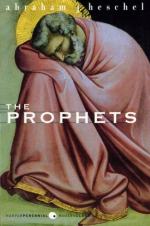
|
| Name: _________________________ | Period: ___________________ |
This test consists of 5 multiple choice questions, 5 short answer questions, and 10 short essay questions.
Multiple Choice Questions
1. In ancient times, Israel only knew God as what?
(a) Redemptive.
(b) Mysterious and terrible.
(c) Impassible.
(d) Loving.
2. What does Heschel call indifference?
(a) Evil.
(b) Rational.
(c) Unjust.
(d) Good.
3. Whose theory said that the prophets were not talking to God but were making judgments about God's desires from the information they had about God?
(a) Nietzsche.
(b) Goethe.
(c) Philo.
(d) Spinoza.
4. When did Heschel examine the state of mind of the prophets with respect to the theory of ecstasy?
(a) When they were prophesying.
(b) When they were receiving the words of God.
(c) When they were speaking.
(d) When they were praying.
5. Heschel links divine inspiration to what?
(a) Poetry.
(b) Dreams.
(c) Songs.
(d) Divination.
Short Answer Questions
1. Some writers in the Bible say that emotions and feelings have been inspired by whom?
2. When the pathos of God is upon a prophet what happens?
3. An emotional religion of sympathy is more compatible with the prophet's mentality than a religion of what?
4. What cultural/religious doctrines did Philo try to mix in his studies?
5. What does Heschel describe as not a goal, but a challenge, a commitment, a state of tension?
Short Essay Questions
1. What was Spinoza's idea about the prophets and does Heschel agree?
2. How does Heschel describe the concerns of the prophets?
3. What is ecstasy?
4. What does Heschel say gives the prophets the courage to speak out?
5. Why does Heschel think it is hard for people to understand the wrath of God?
6. How does Heschel explain the beliefs that the prophets were frauds?
7. What is one difference between apathy and pathos, as explained by Heschel?
8. What is anthropopathy?
9. Who was Marcion?
10. Describe one view of ecstasy and prophets that Heschel describes.
|
This section contains 544 words (approx. 2 pages at 300 words per page) |

|




